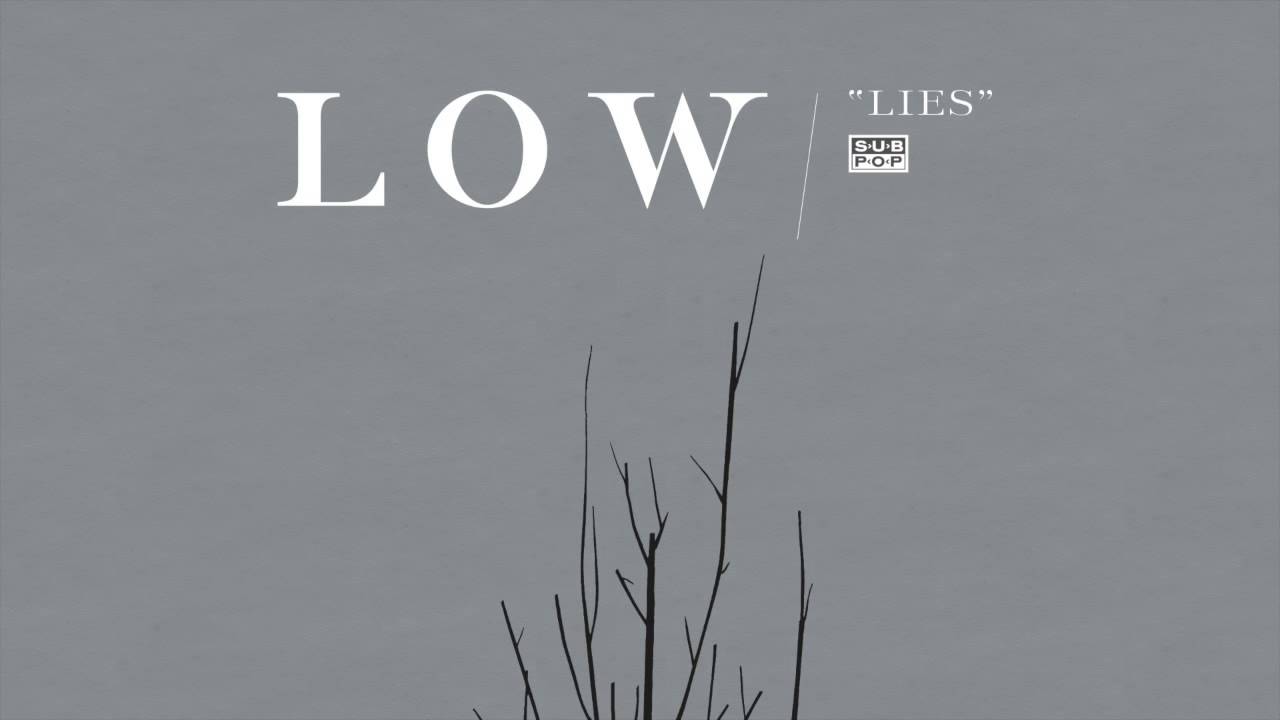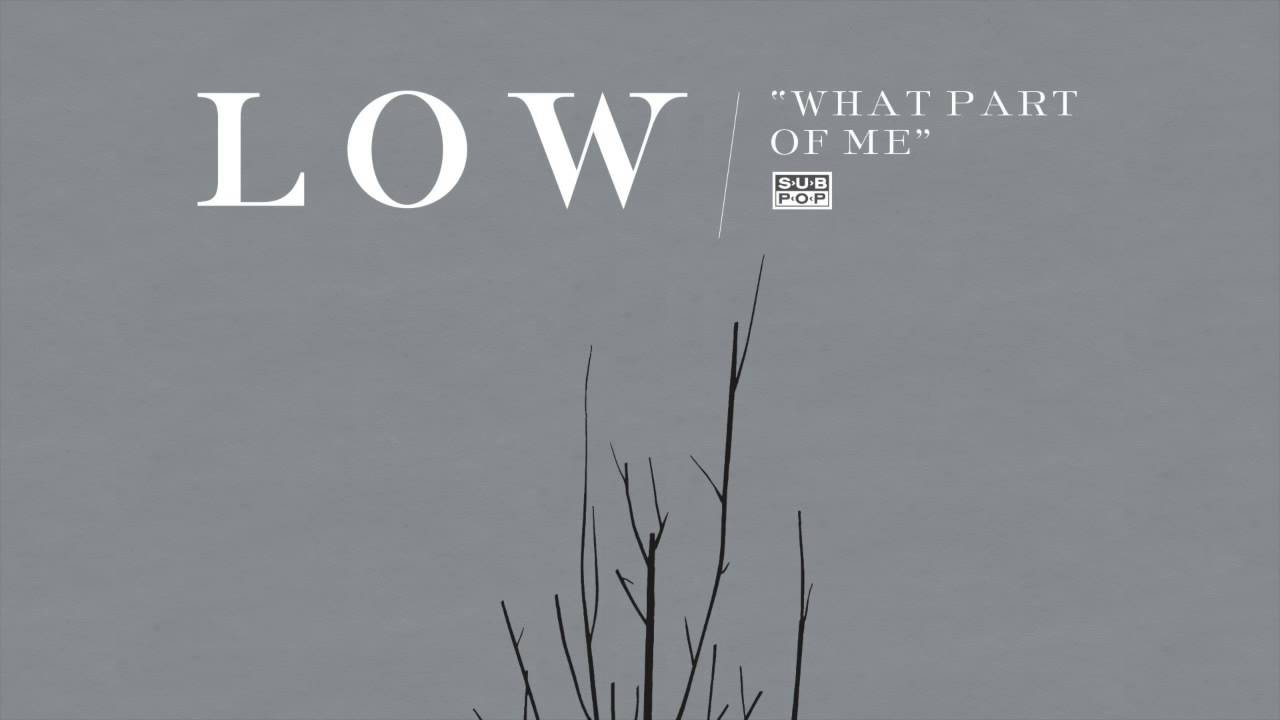When he sings, you can hear Alan Sparhawk’s voice peal like a church bell, the sound immediately arriving in the middle of your head. When he talks, he’s a mumbler, prone to tailing off and leaving long silences that you don’t feel you should fill in case you scare him into clamming up completely. Our conversation, in a skyline-view hotel bar in central London, is equal parts light and dark, practical and ethereal, convivial and serious – an ambivalence that is on full display on Low’s new album (their 11th), Ones And Sixes.
This is Low at their most challenging, their least sweetly palatable and their optimum effectiveness. Compared to a previous double-header of unashamedly melodic records (C’Mon and The Invisible Way), there are scant and precious moments of relief, making their discovery all the more rewarding. As the band’s sound has moved from sparse duets through muscular, taut musical statements, one thing has remained a constant – Sparhawk and his wife, Mimi Parker. They are one of the greatest vocal harmony combinations in modern music (diagrams can be provided for anyone who opposes this indisputable maxim), musical orators with impeccable clarity. So when they muddy the message with complex, intrusive noise and wilful musical difficulty, well, Ones And Sixes becomes a far more complicated beast – the secrets of which Sparhawk is keen to preserve for as long as possible.
I know you like to maintain some mystique around the release of a new record…
Alan Sparhawk: Oh no, that’s fine. The manager comes to us and says, "We need to put together a press release and tell everybody what’s going on… Anything?!” I’m like, "Uh… can’t they just listen to the record?" It becomes more of a preconceived thing nowadays.
Well, in that case, how would you like to PR your new album?
AS: [LAUGHS] I would insult everybody and not do interviews. I’m beginning to think that might be the best approach.
Ah, the Lou Reed school of promo.
AS: Yeah, or Mark Kozelek lately. He’s been knocking them out of the field recently with his non-interviews. That one that was in the Guardian, I was like, “Wait a minute: you didn’t actually interview him.” It was just talking about trying to interview him, getting quotes from his friends and stuff [Sparhawk himself was interviewed by Laura Snapes for the piece]. It ended up being a great article about him. Pretty accurate, actually. That guy doesn’t give a shit.
Please take this as the compliment it’s intended to be, but this new album – it’s what I would call a ‘difficult’ Low record, more in line with Trust or Drums And Guns. Do you worry about making it hard for people to listen to your music?
AS: The youthful side of me would love to make difficult records forever. I definitely have this bone in me that creatively I want to assault people somehow. Basically Low has been this effort to try and keep that in control, and try to let it out in ways that our constructive.
Like bursts of inaccessibility?
AS: I am aware of our tendency to want to make it more disjunct or dissonant. The last couple of records have been a little lighter, more about the song. On each of those records, some of the songs that came up, I felt I had to just leave the song as it was. Why would I go and make something contrary? This record is more about dancing on that edge. To me, in the long run, that’s where I’d rather be. I’ve made music to assault people and to completely drive people out. I understand the drive to do that, and it is something I’m attracted to.
There’s a song towards the end, ‘Lies’, where Mimi’s voice sounds completely…
AS: Surreal!
It’s the most full-blooded we’ve heard her sing, I think.
AS: Yeah, it’s really weird, there are like three different Mim voices on this record. I think it’s the first time she’s done that. But yeah, that tune where she’s like [adopts affectionate falsetto] “BEEEH-NEEEH-NEEEH!”
It sounds like a chorus from a power ballad. Was she trying something new?
AS: Yeah, there were times on this record where she and I were working independently. We had this music, I had some lyrical fragments, she’d be writing lyrics too and we’d just combine them. On ‘No Comprende’ in the second verse I start singing and she has this counter line, almost like two different songs going on that follow the same chords. On this record, for sure, that was the most far-out [take] and we went with that. I don’t know where [the vocal line from ‘Lies’] came from. I remember when she was first tracking that, and I was like, “What are you doing?! This is amazing!” Her voice is just opening up.
Even after 20-plus years, it must be nice to be surprised by what she’s capable of musically?
AS: That’s the lifeblood. That’s the indicator of whether you’re onto something. For me, creatively, you engineer situations where a happy accident can happen. And some people go beyond what you expect. Those are the only indicators you have that you’re doing something valid.
This might be difficult for you to answer, but with Mimi’s voice changing in this way and over the years, what specifically is it about that sound that resonates? Why is it such a good voice?
AS: I don’t know. I’ve read some things where people have talked about it. Lou Barlow wrote something about a tune from the last record, talking about her voice. You’d have to look it up. He just talks about this one song from the last record that Mimi sings and he really sums it up, something about her voice that is unadorned. There’s no pretence to it. Because I know her, I know: that’s her voice. She’s not trying to do anything, she’s not aspiring to anything. I think people know. Deep down, people know when it’s your real voice. You can tell when people are not using their real voice and that can be successful, but most of the time it’s not. She’s a natural. I have to struggle to sing on pitch and with passable tone, whereas it’s very natural for her. Neko Case is like that, Mark Kozelek…
Like I said earlier, this record reminds me most, tonally, of Trust, which is a really confrontational record. What kind of mood were you in recording this one?
AS: That’s probably fair. I know there’s definitely more moments of not understanding. That moment where you’re just observing the situation and not necessarily looking back at a complete story. I think with Mim and I, with our voices going back and forth, there are a few moments that illustrate relationships. If anyone’s ever been in an argument with the person they’re most close with – there’s definitely some relationship stuff in there. I don’t want to say politics, but there’s world concerns and war. The first song is vaguely touching on torture. To me, that’s the epitome of the modern problem. Power, war, torture. It’s more than war. In a weird way it’s also illustrating some of the psychological violence of a relationship. Static violence, static death.

Low have obviously had their 20th birthday and are still going strong – so can we compare it to a successful business for a moment? You have to turn up every day, expand, innovate and carry on. Does it ever feel hard to do that with something that is creatively and artistically very tiring?
AS: Sure. There’s a balance like that all the time. Even a new band can be overwhelmed with the balance of trying to succeed, spending more time promoting than you do writing. If one side of it out-ran the other, it’d be more difficult. The fact that we’ve not been a hit band has been good for us. It’s kept us in touch with what we’re doing and we never get to rest. If we’d had a ‘moment’ early on it would’ve been harder to keep going. Life is always right in front of you. When you write, you always start off with nothing.
Does it ever feel precarious, financially?
AS: Yeah, it’s always a concern. Having kids, the older you get, you realise how few transferrable skills you have. What are we going to do if this all falls apart? There are times when it’s frustrating, too. You’re like, “Here we are, I love this club and we always fill it up. But here we are again!” I don’t know. Maybe a few years ago we would’ve struggled with that more. I’m a little more OK with just playing along and not getting too worried with how it measures up or what else is going on.
When you get to the point where you realise all the bands people are really excited about are a lot younger than you, it’s freeing. You’re not playing that game any more. You want to pay your bills and you’d like for as many people to show up as last time.
Is the band comfortable in that way, with your status? Are you on an even keel?
AS: Yeah, kind-of. We never settle. There’s always new things. We’re excited about this record because it’s different and we’re excited about playing the songs.
Do people ever react badly when you make a stylistic left-turn like on Ones and Sixes?
AS: I don’t think so. Maybe when we did Drums And Guns, after The Great Destroyer which did relatively well for us. I like it when we can successfully do something a little more challenging. It’s more than saying, “Oh, let’s do something really contrary,” it’s really hard. You have to write something that pushes that.
Forgive the lofty nature of this question, but I think given your chosen subjects you’d be a good person to answer it: when you write a song, do you ever write it with the intention of changing the world?
AS: Oh jeez. Who would want to admit to that?!
Not necessarily in a U2 way.
AS: Well, I do admire that, and I think it’s possible. It’s in the same box as playing Madison Square Garden, like a teenage dream that would never go away. It’s in contrast with reality, when you realise what you can say and whether anybody understands it. It’s dangerous. With every generation, people are more sceptical and less inclined to listen to someone who sounds like they’re trying to tell you how to make things better. It goes hand in hand with protesting wars. It’s strange, a lot of people don’t want to hear that shit.
The few times when we’ve been political, I’m always really surprised by how many people are like, [scrunches face, adopts mock-important voice], “Don’t! No! You can’t mix that with music!” I’m like, “Fuck you, man.” Music’s been built on people saying stuff. How can you know the history of music and not know that almost everything [musically] has had some sort of protest [element]? I’m happy when that comes through in what I’m doing, but the second you try to do it intentionally it falls apart. Very few people can be intentional with that and be successful. Even Bono. At this point he probably has more people who poo-poo him than he’d want to know about. He probably genuinely gives a shit, and really early on realised he had a platform, and that he morally had an obligation to use it. It’s tricky language. I’m happy when it comes out in its own way, but to me it’s always risky.
Was there ever a point in the band’s life where you thought you might achieve something like real fame? Like, “Well, there is a chance we could play Madison Square Garden.”?
AS: No. We got to open for Radiohead. That was about as close as we’ll ever get. That’s the big teenage dream when you start listening to music, you know, when you’re like, "I could change the world!", like that Kenny Rogers song. [SINGS] "I could change the world, with my little song, I was wrong."
Low’s Ones And Sixes is available via Sub Pop. The band start a mini-English tour on October 7




